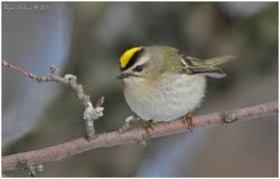 When visitors from the southern states stop at Crossroads, they usually ask about last winter. “Was it really cold? ” they want to know.
When visitors from the southern states stop at Crossroads, they usually ask about last winter. “Was it really cold? ” they want to know.I usually answer with something like, “You can’t imagine.”
“But there are still birds and animals,” they respond. ” If it was that cold, wouldn’t they all just freeze?”
Actually, many of the frogs probably were frozen solid last winter. Our native frogs can freeze in winter, and when they thaw in the spring, they are still alive. Hard to imagine.
One of my favorite nature writers, Bernd Heinrich,wrote in his fascinating book Winter World-The Ingenuity of Animal Survival, “It seems astounding to us that some frogs can survive months of being frozen, or that a bird as small as a kinglet can stay warm and survive even one winter night, much less a whole norther winter. But why, really, are we surprised?
“I think it is because we compare them to ourselves. We feel uncomfortable when we chill only a degree or so and we can’t imagine how a tiny bird keeps warm in a blizzard. Yet for every kinglet that we find in the winter woods, hundreds of thousands of invertebrate animals exponentially tinier than a kinglet survive by doing what for us seems unimaginable.”
All creatures that survive in our harsh northern climate inherit physiological and/or behavioral adaptations that enable them to cope with the demands of winter.
According to Heinrich, “Some creatures survive by developing antifreeze, others must remain in constant motion to maintain their high body temperatures. Even if animals can avoid freezing to death, they must still manage to find food in a time of scarcity or store it in a time of plenty.”
At Crossroads, the animals already are preparing for winter, whether they know it or not. Some are fattening up, others are storing food in winter burrows, many are laying eggs under tree bark which will sustain their species through the cold season. (Remember all of those euphoric news reports last January and February that predicted that our extreme winter would kill off damaging insects? It didn’t).
Still it seems miraculous that animals survive each winter. But when it comes to brutal winters, and apparently there were some doozies a century ago, I simply can’t imagine how our Door County ancestors dealt with the long cold season. On Sunday, August 3, at 2:00 Door County Historical Society President George Evenson will offer a lecture
Actually, many of the frogs probably were frozen solid last winter. Our native frogs can freeze in winter, and when they thaw in the spring, they are still alive. Hard to imagine.
One of my favorite nature writers, Bernd Heinrich,wrote in his fascinating book Winter World-The Ingenuity of Animal Survival, “It seems astounding to us that some frogs can survive months of being frozen, or that a bird as small as a kinglet can stay warm and survive even one winter night, much less a whole norther winter. But why, really, are we surprised?
“I think it is because we compare them to ourselves. We feel uncomfortable when we chill only a degree or so and we can’t imagine how a tiny bird keeps warm in a blizzard. Yet for every kinglet that we find in the winter woods, hundreds of thousands of invertebrate animals exponentially tinier than a kinglet survive by doing what for us seems unimaginable.”
All creatures that survive in our harsh northern climate inherit physiological and/or behavioral adaptations that enable them to cope with the demands of winter.
According to Heinrich, “Some creatures survive by developing antifreeze, others must remain in constant motion to maintain their high body temperatures. Even if animals can avoid freezing to death, they must still manage to find food in a time of scarcity or store it in a time of plenty.”
At Crossroads, the animals already are preparing for winter, whether they know it or not. Some are fattening up, others are storing food in winter burrows, many are laying eggs under tree bark which will sustain their species through the cold season. (Remember all of those euphoric news reports last January and February that predicted that our extreme winter would kill off damaging insects? It didn’t).
Still it seems miraculous that animals survive each winter. But when it comes to brutal winters, and apparently there were some doozies a century ago, I simply can’t imagine how our Door County ancestors dealt with the long cold season. On Sunday, August 3, at 2:00 Door County Historical Society President George Evenson will offer a lecture
called How People Coped in Severe Winters a Century Ago. The program, a part of the Sunday Afternoon in the Village Program will be held in the Vignes School.
Naturalist programs are offered in the Collins Learning Center at 10:00 Monday-Thursday and the Door County Historical Society offers historical programs at 1:30 Tuesday-Thursdays in The Village.

